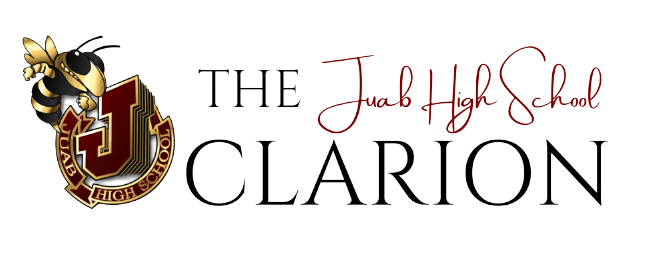What is Speech and Debate?
Speech and Debate is certainly not for the faint of heart. As Mrs. Bingham likes to say it combines the three things people hate the most: research, confrontation, and public speaking. And still, year after year, people sign up to be on a team whose sole purpose is to practice those three things. And if I may be so bold I’d say we’re pretty dang good at it.
In Speech and Debate there are eight events: four speeches and four debates (there are actually a few more drama events but we don’t usually do those at Juab). Usually debaters will either pick one event from each category or specialize in one that they really enjoy. The speech events are national and foreign extemporaneous speaking, impromptu, and oratory.
National and foreign extemporaneous speaking (extemp for short) is a speaking event based on real world topics. You are given three topics to choose from and a timer is set. From that moment you have half an hour to prepare and memorize a seven minute speech on the topic you are given. Topics can be either close-ended or open-ended. Close-ended topics are yes or no questions where you take a side and defend it for the rest of the speech. An example of a close-ended topic would be “Will Israel’s peace deals with UAE and Bahrain lessen conflict in the Middle East?” This question has two definite answers: either it will lessen conflict or it won’t. Open-ended topics are broader in scope. They don’t have a definite yes or no answer, so you have to generate your own. These topics generally deal with complex issues, for example “What was Justice Ruth Bader Ginsburg’s impact on the American political culture?”
The other two speech events are Oratory and Impromptu. In Oratory you have one ten minute long speech that you edit and revise all year. Oratories require extensive preparation before tournaments while in Impromptu you are given three potential topics and seven minutes to prepare and deliver your speech. Impromptu topics are usually either a single word or a quote and your speech must tie back to that some way or another. Oratories are given a lot more freedom; they can cover any topic you can think of as long as you take up the full ten minutes. Wild Oratory topics often become the talk of the town among the team in the common room, and while they do increase your individual fame among other debaters, it is a risky move because it could be off-putting to more conservative judges.
In speech events you are put in a room with many other people to deliver your speeches, while debaters are pitted against one other person or team at a time. Congress is the exception to this. In Congress you are put in a room with a group of other congressmen and -women (often called the House) where you debate for or against different bills on a docket. Congress is also unique because while there is still an impartial judge to observe and determine who performed the best, the House is run by a speaker, elected by the group from among its members. This aspect, as well as the ability the speaker possesses to help or harm individual debaters, makes Congress a very social ordeal. Good congressmen converse with members of other teams to garner votes and improve their standing.
The other debate events, Public Forum (PF), Lincoln Douglas (LD), and Policy are based around resolutions. The resolution is a statement that is under scrutiny in the debate round. Usually resolutions deal with issues facing America or the World, such as affordable housing, renewable energy, or health care. Every team must write two cases for each resolution, one in favor of it called Affirmation or Aff, and one against it called Negation or Neg. PF and LD resolutions are released every two months in September through December, and then every month from January until the topic for the Region and State tournaments is released in March. Policy has the same resolution through the whole year, similar to Oratory, so Policy debaters spend the whole year revising and editing. Policy and PF resolutions deal with practical issues, but whereas PF argues whether or not a given solution is practical, Policy actually comes up with their own solution and defends it. LD resolutions deal with morality; instead of asking whether an issue is practical they argue whether it is morally right.
Speech and Debate is a lot of work, but it is worth it. It teaches you how to research and improves your writing skills so that you can perform better in college and your career, and it also helps to expand your viewpoints. Because you have to write cases for and against every topic you learn to see things from multiple sides. You also become educated about important political and social issues and the steps that governments are taking to address them, allowing you to form your own opinions and become a conscientious and educated voter. Most importantly, you learn to communicate and to express your thoughts clearly. Mrs. Bingham claims that it is the absolute best thing you can do in school to prepare for your future, whatever it may be.

